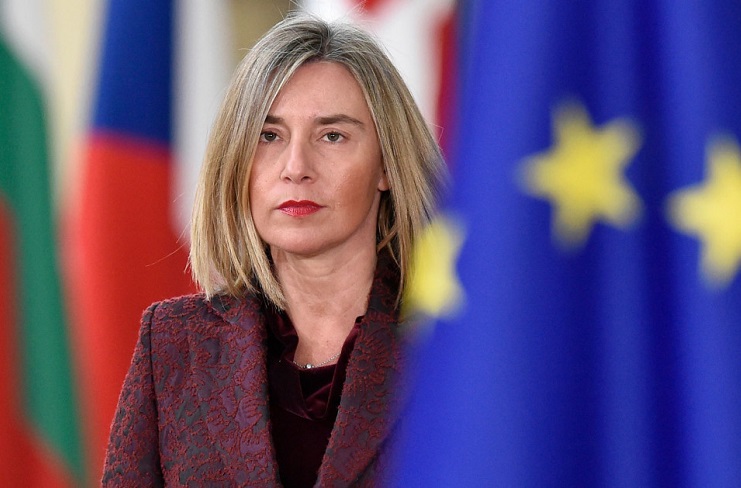Relations between Turkmenistan and the European Union may get a boost starting next year, as EU officials announced the bloc will open a representative office in the Central Asian and Caspian region country.
Federica Mogherini, the High Representative of the European Union for Foreign Affairs and Security Policy, said that Central Asia is going through rapid change, making sustainable connectivity between Europe and Asia ever more important.
“Countries in the region, especially Turkmenistan, are increasingly looking to the EU as a reliable partner for reforms, modernization and to face the global challenges of today, and the European Union is keen as well to strengthen its cooperation with the region,” Mogherini said according to a statement issued by the European External Action Service on Friday.
“By opening a new delegation, we are responding positively to this demands and sending a strong signal to the Turkmen and European citizens about our engagement,” she added.
Mogherini’s statement comes after the foreign ministers of the five Central Asian countries — Kazakhstan, Kyrgyzstan, Tajikistan, Turkmenistan and Uzbekistan — arrived in Brussels last week to attend the EU-Central Asia Ministerial Meeting. The two-day event focused on the development of economic, political and cultural relations with the region, as well as the promotion of legislative and legal reforms in these countries.
With a new representative office in Ashgabat, the EU will be increasing the number of its offices around the world to 141. At the moment Turkmenistan is the only country in Central Asia and the Caspian region to collaborate with the EU through a liaison office and not direct representation.
Relations between the EU and Turkmenistan date to 1998, nearly seven years after the country became independent following the collapse of the USSR. That year the two sides signed an Interim Agreement on trade and trade-related matters, which was prolonged in 2010. The establishment of permanent representation in Ashgabat could enable the EU to step up political and economic dialogue, and help Turkmenistan strengthen its institutions related to security, human rights, energy, climate and the rule of law.
The EU has been negotiating with Turkmenistan to develop the Trans-Caspian Pipeline that could transport natural gas via Azerbaijan and through Georgia and Turkey, further westward to Europe, by linking to the Southern Gas Corridor.
Turkmenistan has the world’s fourth largest proven natural gas reserves, or roughly 18 trillion cubic meters. With a small domestic market for its gas – Turkmenistan is the country in the Caspian region with about 5.3 million inhabitants – it has become the world’s seventh largest exporter of natural gas.
While the idea for a pipeline tapping was first suggested in 1996, its development came to a halt due to the unresolved legal status of the Caspian Sea. Shortly after the Convention on the Legal Status of the Caspian Sea was signed earlier this year, Maros Sefcovic, the Vice President of the European Commission for Energy Union, welcomed officials from Turkmenistan to discuss the Trans-Caspian Pipeline.
But some issues still remain, as the five Caspian countries may lay underwater pipelines only if their projects comply with environmental requirements and standards specified in international treaties to which they are a party.
“Now, to implement this demanded project, we need only the consent of the project parties and an environmental assessment that will meet strict international requirements,” President Gurbanguly Berdimuhamedow said following the meeting in Brussels, according to RIA Novosti.







 Russian peacekeeping forces, deployed in the Karabakh (Garabagh) region of Azerbaijan since 2020, have commenced their withdrawal from the area.
Russian peacekeeping forces, deployed in the Karabakh (Garabagh) region of Azerbaijan since 2020, have commenced their withdrawal from the area.
 Iran's senior military leaders described the drone and missile attack on Israel on April 14 night as “successful".
Iran's senior military leaders described the drone and missile attack on Israel on April 14 night as “successful".
 The number of evacuees from flooded areas in Kazakhstan has reached 97,852 people, including about 32,856 children since March 27.
The number of evacuees from flooded areas in Kazakhstan has reached 97,852 people, including about 32,856 children since March 27.
 Azerbaijan officially unveiled the logo for the upcoming 29th session of the Conference of the Parties to the United Nations Framework Convention o...
Azerbaijan officially unveiled the logo for the upcoming 29th session of the Conference of the Parties to the United Nations Framework Convention o...
 Iranian President Ebrahim Raisi warned Israel that it would face a "real and extensive" response if it makes any "mistake" following Tehran’s missi...
Iranian President Ebrahim Raisi warned Israel that it would face a "real and extensive" response if it makes any "mistake" following Tehran’s missi...



